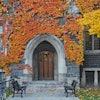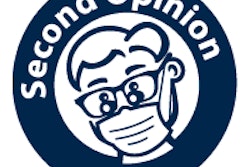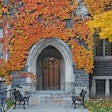
Back in 2002, Charles Tozzer, DDS, of Irvine, CA, never dreamed he would one day oversee a charitable organization that helps more than 1,000 needy kids in California, Mexico, and Haiti get free dental care each year.
But that was the year his nonprofit, Dental Care for Children, first began to take shape, after a hygienist who worked for Dr. Tozzer told him about a mission she was going on with a church group to an orphanage in Mexico.
 Dr. Charles "Chuck" Tozzer founded Dental Care for Children in 2002. Today, the organization donates $650,000 in free dental care annually and helps more than 1,000 kids in the U.S. and abroad each year.
Dr. Charles "Chuck" Tozzer founded Dental Care for Children in 2002. Today, the organization donates $650,000 in free dental care annually and helps more than 1,000 kids in the U.S. and abroad each year.
"And when she told him the kids really needed dental help, he loaded his equipment into his car and headed down there," said Lindsey Johanson, executive director of Dental Care for Children, whose mission is to provide dental services for underprivileged children around the world who don't have access to adequate dental care. "Many of the kids had never seen a dentist before."
From that single clinic at the orphanage in Maneadero, Mexico, the organization now provides eight clinics a year in Mexico and Haiti, plus a series of screening clinics for schoolchildren in Southern California.
"It was very low-key at first," Johanson said. "When they started in Maneadero, they would work 20-hour days, seeing every person who came to the clinic, not turning anyone away. They would work the weekend and then drive back to California and go back to work on Monday. But over time colleagues and patients began to find out and wanted to help out, so it has grown into a larger nonprofit."
Word of mouth
The clinics and the organization are funded primarily through private donations from patients of the dentists who volunteer, she added. Each of the Mexico clinics sees 35 to 40 volunteers, while the Haiti missions typically have 20 to 25 volunteers for each trip.
"The dentists who volunteer are from all over U.S. and Canada, and they get really vested in the project," Johanson said. "They hold fundraisers and reach out to their vendors, and that is how we get a lot of our supplies. We also get help from Kiwanis clubs and rotary clubs."
For example, the Irvine Rotary Club works with Dental Care to help support clinics in Ensenada.
"The rotary took it on as one of their international projects, so twice a year they partner with us and go to different elementary schools in Ensenada or to one of the orphanages," Johanson said. "It touches everyone in the community."
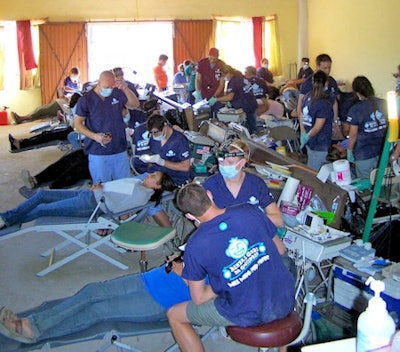 The Dental Care for Children clinic at the community center in Ensenada, Mexico. All images courtesy of Dental Care for Children.
The Dental Care for Children clinic at the community center in Ensenada, Mexico. All images courtesy of Dental Care for Children.A chance meeting with a woman from Haiti who runs an orphanage in Les Cayes -- a city about four hours from Port Au Prince -- led Dr. Tozzer to offer clinics in that country as well. At present they do three clinics in Haiti each year.
"Les Cayes is a larger city, with a population around 200,000, but the infrastructure isn't there and there is still a lot of devastation from the earthquake," Johanson said. "So we began to visit the orphanage there, and we received a lot of donated dental supplies and equipment that we store there because the shipping requirements can make it take six to 12 months just to get through customs. We work at the orphanage but see people from all over the community. Once a year, we also hold a clinic at another orphanage just down the road, the biggest one in Haiti, where we see 200 to 250 kids over three days."
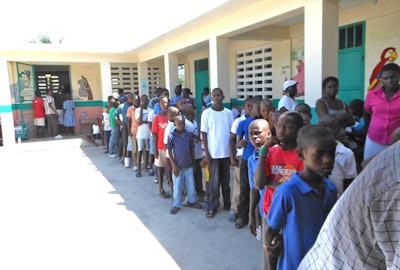 Children lining up to see the dentists at a large orphanage in Les Cayes, Haiti.
Children lining up to see the dentists at a large orphanage in Les Cayes, Haiti.Families share one toothbrush
The quality of the kids' oral health in Haiti is very different than what they see in Mexico, she added.
"In Mexico, a lot of times they will at least have a toothbrush, but in Haiti most of the kids don't have a toothbrush and have never seen a dentist in their lives," Johanson said. "And if they do have a toothbrush, it will be shared by the whole family. So if one has cavities, they all do. Also, sugar cane is very common in their diet, so their teeth will completely erode and be black across the front. All the kids we see say, 'Clean my teeth, clean my teeth.' What they really want is to have all the cavities gone."
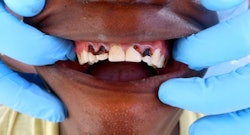
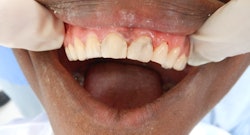 A Haitian boy treated by Dental Care for Children, before and after.
A Haitian boy treated by Dental Care for Children, before and after.Dental Care encourages its dentist volunteers to bring their whole offices with them, even those with no dental background, Johanson noted.
"Our last trip to Haiti, we had a woman with us who spoke fluid French and she taught the kids how to brush their teeth and floss," she said. "She would sing and make them feel welcome, and teach them things about their oral health that will have bigger impact down the road."
The impact Dr. Tozzer and the other volunteers have on the communities they visit goes well beyond restoring smiles.
"A lot of times when the dentists visit the orphanages, the kids look to them as parent figures," Johanson said. "And because we go back every year and get to know them, we develop relationships with these kids. Dr. Tozzer told me about one girl they had seen since she was 8 until she was 20 [at the orphanage in Maneadero] -- she was about to get married and sent him a wedding invitation. So we are taking care of their health but also building relationships and watching them grow up and evolve and move into their lives."
Flexibility and resourcefulness
The organization is always looking for new volunteers for the missions, she added, whether in Haiti, Mexico, or Orange County. Dental professionals can also sponsor a clinic or have their entire team participate. At present, they are also in need of portable dental units for the Mexico clinics and extra dental chairs for the mobile clinics. And there is always a need to restock the clinics with composite materials, etchants, anesthetics, and other supplies, according to Johanson.
"We are very flexible in terms of how we can accommodate groups and even organizations and companies that want to get involved," she said.
In fact, Dental Care for Children prides itself on its flexibility and resourcefulness in making sure that every patient gets the best care possible regardless of the circumstances, she noted.
"One of the unique things about our organization is that we are very resourceful in how we find our supplies and equipment," Johanson said. "When we first started out, we didn't have all the equipment we needed, so we ended up having to make a lot of our equipment. For example, in the beginning, we made dental chairs out of two pieces of plywood and a roll of paper towel as headrest. And to this day in Haiti, we use moonshine and rum to make our own sterilizing fluid -- it's cheaper than anything we can buy there. We have a lot of mechanics who volunteer with us who can fix anything, and we are very proud of this: that we can take pretty much anything and utilize it to help people."


